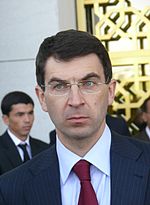
Last week, an important event came (and even life-determining, ready to have an effect on the years ahead): the decision of the State Commission on Radio Frequencies (SCRF), taken at a meeting on Thursday, September 8, 2011. If you read the
brief meeting report posted on the website of the Ministry of Communications on the next day (September 9), here are the main news:
- There will be no more than seven LTE operators in Russia, for which the frequency band from 791 to 862 MHz is allocated.
- LTE operators will be determined on a competitive basis: the four winners of the competition will receive the right to build dual-band networks, and the other three will be single-band in the upper band.
- Allocation of frequencies due to the obligation of the operator to perform a frequency conversion (at his own expense to remove transmitters from this range - for example, the military), in return, the operator is guaranteed the right to exploit the ranges that he cleared.
- On the possibility of using LTE in the radio frequency bands of existing operators, it was decided to complete the research and submit proposals to the GKRCh in the first quarter of 2012. That is, this LTE will not be even for at least six months.
If you stop at this place, then you can be a little (and not unreasonably) glad that the matter has finally moved from a dead end; however, it is enough to rise and move on, reading messages in the press and asking even the simplest questions (“Who benefits?”, “How will it be?”), as you stumble upon a series of unpleasant news and slightly contradictory interpretations of what happened.

Minister Shchyogolev (this is the one that promised a habra interview that actually
did not happen ) gave two interviews where he touched upon cellular communication and LTE issues: a
text interview with RIA Novosti
and a video interview with Russia 24. In each of these interviews, the minister showed himself to be a consistent adversary of the technological neutrality principle - namely, the adversary who asserted that the introduction of LTE at those frequencies already allocated to mobile operators will inevitably lead to degradation of the quality of traditional (voice) services. Personally, the position taken by him on the issue of neutrality grieves for about the same reasons as the
position announced
by the Rostelecom President in the spring: both talk about the fact that the transfer of large amounts of data is not necessary for the average user, but for individuals who and should be forced to shell out separately. (It appears that the development of, for example, file sharing, videophones, network video broadcasting will inevitably be restrained not only by the inertia of the users' minds, but also by the inertia of their wallet.) Moreover, it becomes quite clear that if the matter depended on the minister, then GKRCh decisions (on the possibility of using LTE in the radio frequencies of existing operators) would be a hard refusal; even unwittingly, you begin to suspect that the current undertaking (to conduct research, submit proposals) also masks the refusal, that's just a bit softer, and deferred, and expensive.
The second unpleasant news (and for some of which by importance it will most likely become, I suspect, even the first one),
reports RIA Novosti (September 9), and you can transmit this news in two words: the
end of WiMAX . Thousands of Vaimaks subscribers (MTS has only
Comstar-UTS in Moscow,
and Scartel’s in all cities of the Yyota WiMAX presence: Moscow, St. Petersburg, Krasnodar, Sochi, Ufa ...) will remain in a year (in September 2012) without mobile Internet, their frequencies will be selected in favor of LTE implementation, their purchased modems will suddenly turn into useless bricks (or key rings, or plastic eggs), and their operators will not even intervene for them if they wish to maintain good relations with ministry and state. Although (as
creat0r tells me
in the comments ), WiMAX will remain from the operator Freshtel, whose frequency is outside the redistributed range.
')

True, RIA Novosti’s hunch that WiMAX operators will hand over frequencies without a fight was
apparently not entirely correct - at least in the MTS’s opinion, Vedomosti
( September 9 ) and CNews
( 16 September ) that MTS will fight: submit a complaint to the FAS against the decision of the SCRF and even leave the “LTE Union”, previously
created in the presence of Putin . Interestingly, the chairman of LTU Union told the Kommersant newspaper
( September 9 ) that the consortium had completed its task, so both his work and the participation of MTS in it, one would think, would have ended this way and that.
Last week, news appeared that MTS is
organizing the first demonstration zone of the LTE network in Siberia and the Far East as part of the work of the VII Baikal International Economic Forum and the celebration of the 350th anniversary of the city of Irkutsk; it is mentioned that the data transmission rate in the LTE network reaches about
80 Mbit / s in the direction to the subscriber. This news,
apparently, means that MTS is an operator ready for LTE; This means that MTS simply does not want to lose the ready WiMAX operation zone in Moscow for the time that is required for conversion and other preparation of ranges for LTE. Judging by the article the day before yesterday in the Kommersant newspaper
( September 15 ), MTS and its parent company Sistema will seek compensation for half a billion dollars in order to be able to build a new mobile Internet network instead of what the GKRCH decision will lead to inoperability.
Everyone has long known what Russian “contests” are: they are held only when the list of winners is known in advance.
Apparently, the distribution of frequencies considered by us also turned out to be so, because both
Gazeta.Ru ( September 8 ), and Kommersant ( September 9 ), and ComNews
( September 9 ) unanimously report that the three single-band networks will go to Scartel , Osnova Telecom and the winners of last year’s tenders for frequencies in 40 regions (Rostelecom and Vaynakh Telecom), and four dual-band networks will receive MTS, Beeline, MegaFon and Rostelecom.

Smaller players (Tele2, TTK, Smarts, etc.) are not in the business. They can hope either for the support of FAS (about the possibility of which
RBC writes ), or to participate in tenders despite predestination (Alexey Boyko commented on the Tele2 press service commenting on determination), or the triumph of the technological neutrality principle, that is, the coexistence of GSM and LTE in the same range, contrary to the position of the minister (as
Gazeta.Ru and Marker wrote
). All these are not reliable levers, they allow us to be pessimistic in advance that Tele2 will not be allowed to reach LTE just as it was not allowed to 3G. This is regrettable, as I have
already said .
A complete table of all the redistributed ranges can be found on one of the day before yesterday pages of Kommersant
( September 15 ).As for Nahum Marder’s
retelling of ComNews (“the deputy minister believes that Russia does not need seven LTE networks, but
one or two is enough
”), it is appropriate to think that he made this statement in ecstasy (like the old
Taseyevo clerk ).
 Last week, an important event came (and even life-determining, ready to have an effect on the years ahead): the decision of the State Commission on Radio Frequencies (SCRF), taken at a meeting on Thursday, September 8, 2011. If you read the brief meeting report posted on the website of the Ministry of Communications on the next day (September 9), here are the main news:
Last week, an important event came (and even life-determining, ready to have an effect on the years ahead): the decision of the State Commission on Radio Frequencies (SCRF), taken at a meeting on Thursday, September 8, 2011. If you read the brief meeting report posted on the website of the Ministry of Communications on the next day (September 9), here are the main news: Minister Shchyogolev (this is the one that promised a habra interview that actually did not happen ) gave two interviews where he touched upon cellular communication and LTE issues: a text interview with RIA Novosti
Minister Shchyogolev (this is the one that promised a habra interview that actually did not happen ) gave two interviews where he touched upon cellular communication and LTE issues: a text interview with RIA Novosti  True, RIA Novosti’s hunch that WiMAX operators will hand over frequencies without a fight was
True, RIA Novosti’s hunch that WiMAX operators will hand over frequencies without a fight was  Smaller players (Tele2, TTK, Smarts, etc.) are not in the business. They can hope either for the support of FAS (about the possibility of which RBC writes ), or to participate in tenders despite predestination (Alexey Boyko commented on the Tele2 press service commenting on determination), or the triumph of the technological neutrality principle, that is, the coexistence of GSM and LTE in the same range, contrary to the position of the minister (as Gazeta.Ru
Smaller players (Tele2, TTK, Smarts, etc.) are not in the business. They can hope either for the support of FAS (about the possibility of which RBC writes ), or to participate in tenders despite predestination (Alexey Boyko commented on the Tele2 press service commenting on determination), or the triumph of the technological neutrality principle, that is, the coexistence of GSM and LTE in the same range, contrary to the position of the minister (as Gazeta.Ru